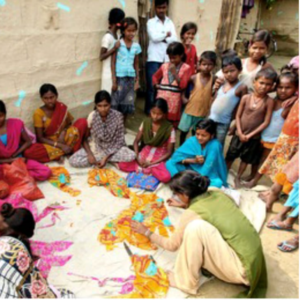 The significant majority of rural population of Pakistan depends on agriculture farming, livestock and fishing as primary source of livelihood and income. Since inception of Pakistan village community is deprived of from clean and drinkable water, education and healthcare facilities. The rural population for facing natural calamities like earthquake, floods, and droughts depends on US-AID, WHO, WFO and UNICEF.
The significant majority of rural population of Pakistan depends on agriculture farming, livestock and fishing as primary source of livelihood and income. Since inception of Pakistan village community is deprived of from clean and drinkable water, education and healthcare facilities. The rural population for facing natural calamities like earthquake, floods, and droughts depends on US-AID, WHO, WFO and UNICEF.
Frontier Post on October 25, 2000 said that whenever war broke out in any part of world it affected children. During last decade two million children worldwide have been killed as a result of war, four to five million children have been disabled, 12 million have been left homeless, more than one million orphaned or separated from their parents, approximately ten million children have been psychologically traumatized as a result of war.
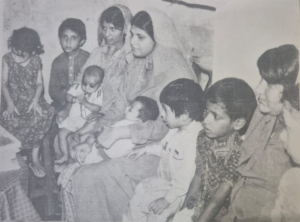 At other hand the women in her daily life face lengthy working hours including multiplicity of task of food preparation, child rearing, taking care of kitchen garden and farm animals. She also faces threat of infectious deceases caused by the poor environmental conditions. The U.S representative to the United Nation Commission said “Yet in many regions of the world, especially in the regions of conflict, women have little political clout, lack protection for their basic human rights as well as disproportionately under educated and are the most economically vulnerable”.
At other hand the women in her daily life face lengthy working hours including multiplicity of task of food preparation, child rearing, taking care of kitchen garden and farm animals. She also faces threat of infectious deceases caused by the poor environmental conditions. The U.S representative to the United Nation Commission said “Yet in many regions of the world, especially in the regions of conflict, women have little political clout, lack protection for their basic human rights as well as disproportionately under educated and are the most economically vulnerable”.
Regarding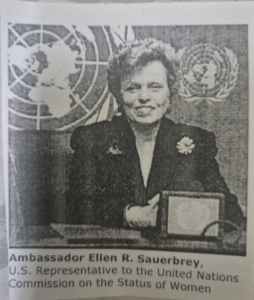 economical vulnerability of women, Mr. Mike D. Woods, Professor, Oklahoma State University said “economy” is a system for meetings the needs and wants of people in specific geographic area, community, region and nation the volunteer may provide an important link to the community”
economical vulnerability of women, Mr. Mike D. Woods, Professor, Oklahoma State University said “economy” is a system for meetings the needs and wants of people in specific geographic area, community, region and nation the volunteer may provide an important link to the community”
It is hard fact that in 19th century concept of community service through student volunteers gained momentum in Central Europe and USA initiated by world renowned voluntary organization like YMCA founded in 1844 and Salvation Army which was founded in 1865 promoted volunteer works through students in local communities.
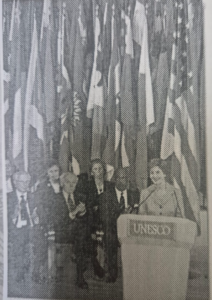 In fact the spirit of community services was exposed in world wars first and second (1914-1945) whence large scales helping camps and missionary services were introduced for uplifting war affected people as well as to reconstruct or improve the damaged or ruined areas. Overseas volunteering traced back over more than hundred years. British Red Cross initiated “Voluntary-Aid” schemes for the whole world. In the new world order volunteering movement for food enhancement is carrying out by FAO and US-AID, UNICEF and UNESCO agencies.
In fact the spirit of community services was exposed in world wars first and second (1914-1945) whence large scales helping camps and missionary services were introduced for uplifting war affected people as well as to reconstruct or improve the damaged or ruined areas. Overseas volunteering traced back over more than hundred years. British Red Cross initiated “Voluntary-Aid” schemes for the whole world. In the new world order volunteering movement for food enhancement is carrying out by FAO and US-AID, UNICEF and UNESCO agencies.
In the year 2003 UNESCO said no nation, we have learned, is immune. We have seen terrorism in the Middle East, Africa and Southeast Asia. My own country was a target on a terrible September morning tow year ago. Since that day, act of terror have robbed innocents of their lives in Jakarta, Pakistan and Riyadh. And last civilized world, striking the United Nation headquarter in Baghdad, killing those who had come to deliver the humanitarian help and hope to the people of Iraq. (UneSCO Statement on Plenary Session in Paris)
In 1964 few people retired from the Indian Civil Services migrated Pakistan founded a not-for-profit organization Agriculture Education Development and Welfare Board (AED BOARD) headquartered at Karachi the then capital city of Pakistan to promote and inculcate basic farm education to school students to enhance food productions through volunteerism during student life. During initial stage school students were trained in plantation of trees and preparation of grassy lawns into the premises of their respective schools. Befitting arrangements were also made for visiting villages situated in the nearby vicinity during vacations for practical knowledge.
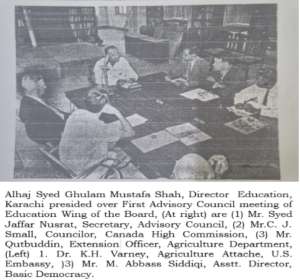 While participating First Advisory Meeting of Trainers of Trainees of the Agriculture Education Development and Welfare Board (AEDW BOARD) US-AID Agriculture Officer of US Embassy, highly accentuating the efforts of the Agriculture Education Development and Welfare Board for launching volunteering in schools. He emphasized need of school volunteering programs in all schools of the country like the lines followed across the United Estate, particularly under the US National and Community Service Act of 1990.
While participating First Advisory Meeting of Trainers of Trainees of the Agriculture Education Development and Welfare Board (AEDW BOARD) US-AID Agriculture Officer of US Embassy, highly accentuating the efforts of the Agriculture Education Development and Welfare Board for launching volunteering in schools. He emphasized need of school volunteering programs in all schools of the country like the lines followed across the United Estate, particularly under the US National and Community Service Act of 1990.
Beside students volunteers programs in Sindh Province (AEDW BOARD) also initiated such programs in the former East Pakistan during 1966 and kept continued in 36 privately owned schools in far flung rural areas till Bangladesh liberation war in 1971. The program was designed by the then founder member of (AEDW BOARD)
(Now the existing Chief Executive of wwc. care) with the technical support of Dr. Akhter Hameed Khan who was world renowned Rural Development Economist and Consultant of Bangladesh Rural Development Academy.
It is worth to add here that resultant to the unfortunate Bangladesh liberation war in 1971 significant numbers of people entered into the country particularly Karachi where an influx of about 600,000 Afghan refugees were already living in because of the USSR Army invasion in their country in 1979.
Again in the year 2001several thousands refugees from Afghanistan migrated to Karachi where parentless male and female children found snatching cell phones from people and also involving in the other heinous crimes. To overcome such menace the Board of Governors, WWC-CARE decided to set up 500 bedded teaching Hospital approved earlier by Sindh Government.
The WWC-CARE approached Afghanistan government for initiating relief operation into war hit areas and to set up healthcare and education projects for war affected government kept such proposal on hold till the cessation of shelling and carpet bombing into the targeted areas.
In fact the delaying tack-tics of Afghanistan authorities to grant permission of the said relief activities was aimed at putting an iron curtain over foreign invasion reported as “Operation Enduring Freedom” began on October 7, 2001 by US army. Surveys indicated that said operation was launched for taking revenge of 9/11 terrorist attack. In other words the primary goal of such tacks tics was for ousting Taliban regime.
The WWC-CARE arranged enormous amount of US$ 500 million for initiating relief and capacity building activities through setting up state-of-the-art Humanitarian City and 500 bedded teaching Hospital at Karachi for the people entering into Karachi from Afghanistan. But unfortunately after general election and formation of government the PPP put the above mentioned proposal under carpet in spite of firm commitment of the then Governor of the province. WWC-CARE filed writ petition before the Sindh High Court, (Suit No.1148/8.9.2006). After considerable long time Sindh High Court passed orders saying that Governor Sindh was not empowered to allot said plot of land.
After winding up relief activities for war affected people of Afghanistan entering into Pakistan, the WWC-CARE made befitting arrangement through another foreign NGO operating in Mosul and Tikrit for supplying food items and rehabilitation of rural community of Fallujah, province of Iraq of the. Fallujah was extensively damaged and facing humanitarian crisis due to intense fighting between US forces and Iraqi soldiers. Fallujah city and its far flung rural areas were reported largely ruined. The international surveys said that 60% of buildings were completely damaged. 9000 houses were partly destroyed. 60 schools and 65 mosques and shrines in Fallujah were destroyed.
The foreign NGO utilizing WWC-CARE funds set up several shed, ware houses and Kitchen to provide fresh foods for the needy people along with the following items:
1. Non-perishable staples: Rice and wheat flour, lentils and other grains and different utensils to cook foods.
2. High calories Food: Dried fruits and energy bars.
3. Ready-to-eat-meals: Canned goods, dried soups and meal–ready-to-eat (MREs).
4. Fortified Food: Vitamin-enriched biscuits, iodized salt and fortified cooking oils.
5. Bottled water and hydration: drinking water, water purification tablets or filters.
Non-Food Items.
6- Shelter and beddings: Tents, blankets, sleeping bags and mattresses.
7- Hygiene and sanitation: Soaps, tooth brush, toothpastes, sanitary pads and toilet papers.
8-First aid and medical supplies; Bandages, antiseptic, wipes, painkiller
9-Clothings and foot wears: Water, sanitation facilities and the other essential services, providing readymade wares, shoes, sleepers of proper size to the displaced children and families. Advocating for safe access to civilians in need.
Several international aid giving agency having sufficient funds adjusted their operations in Iraq over time.
